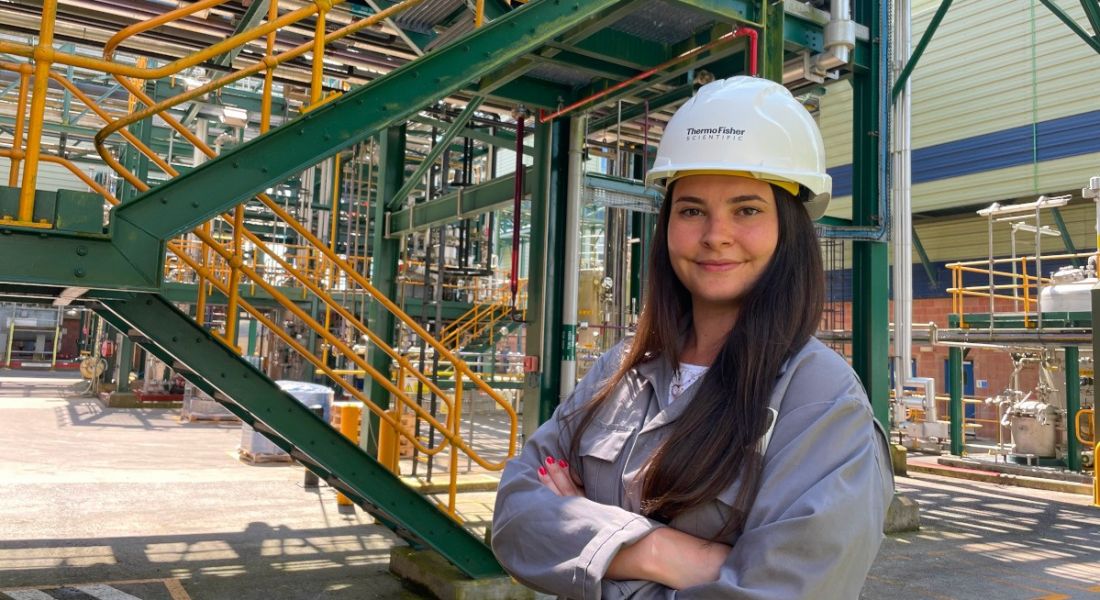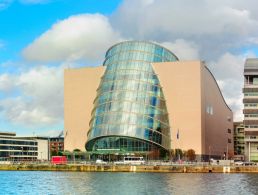Sarah Kelly discusses her sometimes surprising, always rewarding engineering role at Thermo Fisher Scientific.
Sarah Kelly is a process engineer at Thermo Fisher Scientific’s Cork site, a company that specialises in developing and manufacturing active pharmaceutical ingredients for a range of customers.
In 2020, Kelly graduated from University College Cork with a bachelor’s degree in chemical and process engineering. In her current role at Thermo Fisher Scientific, she works in the R&D facility and is the lead engineer on a potential new treatment for breast cancer that is in phase three clinical trials.
‘When issues come up, you want to do your job properly, efficiently and to the right quality’
What drew you to engineering?
I always loved maths, so it was a process of elimination. I didn’t do physics or applied maths for the Leaving Certificate, which would be typical for engineering, but I don’t think I was at a disadvantage going into college.
I went into general engineering in first year as a taster for everything. I liked chemistry when I was in school, and I knew I wanted to work in the pharmaceutical industry – making products that are helping patients and making a difference.
My dad started out as an engineer and has become very successful in the pharmaceutical industry. I really look up to him. When I was younger, my granddad would have shown me how to work with all the tools in the shed and I took an interest in what he’d be getting up to, so it was that side of my family that showed it as an option.
What do you enjoy most about your job?
There’s something new every day – you never know what you’re going to be coming in to. There are always new things to learn and new challenges. It’s never boring!
There are often issues that come up and it’s having the ability to be able to solve those problems – you’re working with lots of different people and you’re all collaborating to come to a solution.
Oftentimes, you’ll be under pressure and it spurs you on a bit. When you have that issue fixed, it’s the most rewarding thing because you know the drug is going to be made now and everything is back on track.
What’s the most exciting development you’ve witnessed in engineering since you started working in it?
We’re seeing a lot of push onsite at Thermo Fisher Scientific to make energy savings at the moment and improve our overall sustainability. Not only because the prices are very high for energy bills, but also, we’re doing the most we can for the environment.
The site wind turbine generates 24pc of the site’s electrical energy, with all other electricity coming from green sources. We have a target to reduce our greenhouse gas emissions by 30pc by 2030 and to be net-zero by 2050.
We are doing lots of different things across the site to help us get there, from everyone being more energy-conscious and switching equipment off when not in use, to using all LED lighting, adjusting heating, insulating the 2.5km of pipework on site and upgrading boilers and air-conditioning systems.
We’ve also been implementing new ways of working across the different functions – looking at every aspect and seeing where you can be more sustainable and reduce waste, from solvents to water.
What’s been the hardest thing you’ve had to face in your career, and how did you overcome it?
Being able to perform under pressure. That’s where the team element comes in – working together in collaboration and supporting each other.
Schedule-wise, as a CDMO (contract development and manufacturing organisation), we need to develop the products in a certain timeframe so they meet the customer’s expectation and can go to market.
When the issues come up, you want to do your job properly, efficiently, and to the right quality – it’s juggling all that and doing your best for the customer and, ultimately, the patient. That’s what it all boils down to.
If you had the power to change anything within the STEM sector, what would that be?
Visibility and education. Having access to subjects like engineering or physics in school, especially for an all-girls school, or at least having the option to do it outside of school.
Being in an all-girls school, it wasn’t as clear to us what the potential career paths in STEM were. What’s needed are more visits to schools from those working in these fields, as well as site visits so we can visualise the varied types of roles out there. Seeing is 10 times better than just hearing something.
‘I never imagined when I was in school the type of work I would be doing, but it’s incredibly rewarding’
Which of your personality traits makes you best suited to your job and engineering in general?
Being creative and having a good ability to solve problems – sometimes you have to think outside the box. Open, effective communication with the people you are working with and being friendly is a big thing as well. And that’s not just within your own team – it really helps whether it’s customers or different departments. If something comes up, you can go to that person you have built a relationship with and it’s much easier to solve any issues.
How do you make connections with others in the STEM community? Have you had any mentors that inspired you?
The Women Employee Resource Group at Thermo Fisher run weekly or bi-weekly meetings, and I had the option to get a mentor through that. It’s fantastic to have a mentor who can share her insights and how she’s gotten to where she is and discuss my own career plans – she’s fantastic.
What advice would you give to someone thinking about a career in your area?
Have the basic knowledge that you’d be interested in the core subjects – maths and a science subject. You need to have that natural interest and aptitude as the degree isn’t a walk in the park by any means.
However, once you get that degree, you will start seeing results and it opens up so many varied career options. I’m making active pharmaceutical ingredients (APIs) in Thermo Fisher that have the potential to treat breast cancer or diabetes. The work that you put in does pay off and it is worth it in the end, but just to be aware that it’s not always easy and that’s okay too.
It’s easy to get lost in the work itself and to focus on the day-to-day tasks. I think it’s very important to ground yourself and remind yourself that this is a product that could have a huge impact on so many people in such a positive way.
I never imagined when I was in school the type of work I would be doing, but it’s incredibly rewarding.
10 things you need to know direct to your inbox every weekday. Sign up for the Daily Brief, Silicon Republic’s digest of essential sci-tech news.




